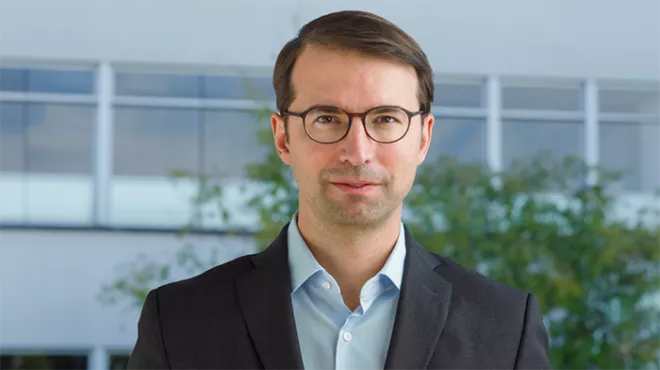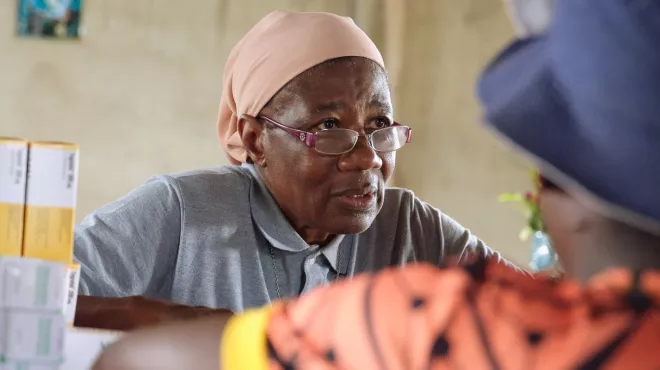Over the last 15 years, huge progress has been made in the fight against malaria, with the number of people dying from the disease dropping by almost two-thirds.1 Yet signs of resistance to existing antimalarial drugs are a rising concern, and the search is on for a replacement. Martin Grobusch is one of the researchers helping to test an experimental new Novartis antimalarial called KAF156. Since 2001, he has supervised clinical studies, patient care and teaching at the Centre de Recherches Médicales de Lambaréné (CERMEL) in Gabon, one of central Africa’s leading tropical-disease research centers. We spoke with him about his work and the challenge posed by the malaria parasite’s emerging resistance to today’s standard treatment.
What motivates you?
Grobusch: My entire career has been entirely geared toward working on tropical diseases in low- to middle-income countries.
I always found malaria extremely fascinating. For decades, the health community was clueless about how to tackle the disease. When I started studying medicine, the old drugs were failing, there was no concept, and no one was investing. This has changed dramatically over the last 15 years, and there are now many positive signs that malaria is on the retreat. If we can sustain the effort – and if we are as inventive, flexible and resilient as the malaria parasite – we can make a difference. That is my big motivation to stay in malaria research.
Do you have a personal story you could share?
Grobusch: I remember sitting all night with a child almost dying from malaria, and all I could do was watch the incredibly slow quinine infusion drip. Despite all my medical knowledge and all our predictive tests, we did not know if the child would walk or die the next day. Seeing kids surviving under these circumstances certainly influenced and reinforced my choice to work in this field.
If we can sustain the effort – and if we are as inventive, flexible and resilient as the malaria parasite – we can make a difference. That is my big motivation to stay in malaria research.
Martin Grobusch, professor of tropical medicine at the University of Amsterdam, and clinical work group leader at CERMEL
What is the role of CERMEL?
Grobusch: CERMEL has a long history in the local community; it’s likely that almost every child born in Lambaréné has taken part in a malaria clinical trial! The community knows the hospital and the research unit, and it has become an important part of the fabric of local life over the years.
Infectious diseases are at the center of what we do at CERMEL. These include malaria, HIV and tuberculosis, but also local infections – worms such as trypanosomiasis, and bacterial and viral diseases like dengue, Ebola and chikungunya. The work mainly focuses on epidemiological interventions and control tools, especially vaccines and drugs. While most of the work has traditionally been focused on clinical research, we are now expanding to preclinical trials, such as Phase I in healthy volunteers. This is important because we should be testing in volunteers who most closely resemble the final target population for the medicines.
Why is it important to do local clinical trials in diseases like malaria?
Grobusch: When it comes to tropical diseases, there is a strong geographical factor at play. For example, in the Sahel [the region just south of the Sahara Desert], where we see little malaria in dry season but a surge in the wet season. Here, transmission is not the same as in the tropical belt, where there is little seasonal variation. This impacts mosquito-biting behavior, which can then impact which control tools are best to use.
That’s why it’s almost impossible to extrapolate clinical trial results for a novel malaria drug from one location to the rest of the world. You have to fan out and examine the same compound under the same conditions in many different places. I believe we are well advised in malaria to recruit patients from across Africa because so many biological, environmental, ecological, human factors can impact outcomes. Only pooled data can provide the complete information we need.
How important are new malaria medicines?
Grobusch: They are of utmost importance if we want to keep up the momentum in the fight against malaria. As with any disease, there is a complex interplay between host, environment and pathogen. And as a rule, the pathogen is always one step ahead. Whatever drugs we throw at it, even if they are used wisely, there will inevitably be resistance. This is precisely what led to the control disaster we had in malaria 20 years ago, when the standard drugs in Southeast Asia lost their power as resistance developed. We had no novel drugs, and only the combination of failing drugs could bridge the gap until we had developed the artemisinin-based combination therapies (ACTs) used today.
Now, we have a luxurious situation – access is more secure and health infrastructure much improved, so there is really no reason that anybody should die from malaria due to unavailability of drugs. But there are the first hints of resistance developing against ACTs. It is very clear that, over the next five to 10 years, we will need replacement drugs and strategies. That’s why the development of new antimalarials is so very important. It will take some years before they are available – and by then we will need them desperately.
Meet Martin Grobusch, #malaria investigator.



